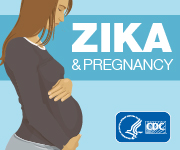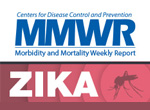Zika Virus — What Clinicians Need to Know
Overview
Zika virus is a mosquito-borne flavivirus transmitted primarily by Aedes aegypti mosquitoes and an estimated 80% of persons infected with Zika virus are asymptomatic. Symptomatic disease is generally mild, with symptoms of fever, maculopapular rash, arthralgia, or nonpurulent conjunctivitis that typically last from several days to one week. Sporadic cases and outbreaks of Zika virus disease have occurred in countries in Africa and Southeast Asia. In 2015, the first local Zika virus transmission in the Americas was reported in Brazil and local transmission has now been in several countries or territories in the Americas. In the current outbreak in Brazil, a marked increase in the number of infants born with microcephaly has been reported and Zika virus infections have been confirmed in some infants with microcephaly. However, it is not known how many of the microcephaly cases are associated with Zika virus infection. Travelers to areas with ongoing outbreaks are at risk of becoming infected and spreading the virus to new areas, including the continental United States. During this COCA Call, participants will learn about the epidemiology and clinical manifestation of Zika virus disease and how early recognition and reporting of suspected cases can mitigate the risk of local transmission.
Ingrid Rabe, MBChB, MMed
Medical Epidemiologist
Division of Vector-Borne Diseases
Centers for Disease Control and Prevention
Dana Meaney-Delman, MD, MPH, FACOG
Medical Officer
National Center for Emerging and Zoonotic Infectious Diseases
Centers for Disease Control and Prevention
Cynthia A. Moore, MD, PhD
Director
Division of Birth Defects and Developmental Disabilities
National Center on Birth Defects and Developmental Disabilities
Centers for Disease Control and Prevention
- Describe the epidemiology, clinical manifestations, management, and prevention of Zika virus disease
- Discuss diagnostic testing for Zika virus infection and interpretation of test results
- Articulate the importance of early recognition and reporting of cases
- State the recommendations for pregnant women and possible Zika virus exposure
- Discuss evaluation of infants with microcephaly and the relationship of Zika and microcephaly
- Slides:View Now
- Transcript:Read Now
- Audio:Listen Now
- Webcast:Watch Now
- Transcripción en Español:Leer Ahora
- Audio conference call on 1/26/16: 2:00 - 3:00 PM
- Web-on-demand training after 3:00 PM on 1/24/16
- Materials: PowerPoint slide set
- CDC Zika Virus
- CDC Zika Virus Clinical Evaluation and Disease
- CDC Zika Virus Diagnostic Testing
- CDC Facts About Microcephaly
- CDC Zika Travel Health Notices
- Interim Guidelines for Pregnant Women During a Zika Virus Outbreak — United States, 2016. Morbidity and Mortality Weekly Report (MMWR). January 22, 2016/65(2); 30-33
Accreditation Statements
Continuing Education
- Activity number:WCWD2286(SC)
- Date of origination:December 12, 2013
- Date of renewal:December 12, 2015
- Date of expiration:December 12, 2017
- Prerequisites:None
- To earn continuing education/contact hours
Target Audience
- Physicians
- Nurses
- Pharmacists
- Veterinarians
- Physician Assistants
- Health Educators
- Other Clinicians
Hardware/Software
Additional Information
- Contact Information:coca@cdc.gov
- Support/Funding:Centers for Disease Control and Prevention, Emergency Risk Communications Branch
- Method of Participation:You may participate in the educational activity by viewing the program information above.
- Fees:COCA continuing education credits are free.
Accreditation Statements
CME:The Centers for Disease Control and Prevention is accredited by the Accreditation Council for Continuing Medical Education (ACCME®) to provide continuing medical education for physicians.
The Centers for Disease Control and Prevention designates this live activity for a maximum of 1.0 AMA PRA Category 1 Credit™. Physicians should only claim credit commensurate with the extent of their participation in the activity.
CNE:The Centers for Disease Control and Prevention is accredited as a provider of Continuing Nursing Education by the American Nurses Credentialing Center's Commission on Accreditation.
This activity provides 1.0 contact hour.
IACET CEU:The Centers for Disease Control and Prevention is authorized by IACET to offer 1.0 CEU's for this program.
CECH:Sponsored by the Centers for Disease Control and Prevention, a designated provider of continuing education contact hours (CECH) in health education by the National Commission for Health Education Credentialing, Inc. This program is designated for Certified Health Education Specialists (CHES) and/or Master Certified Health Education Specialists (MCHES) to receive up to total 1.0 Category I continuing education contact hours. Maximum advanced level continuing education contact hours available are 0. CDC provider number 98614.
 CPE:The Centers for Disease Control and Prevention is accredited by the Accreditation Council for Pharmacy Education as a provider of continuing pharmacy education. This program is a designated event for pharmacists to receive 0.1 CEUs in pharmacy education. The Universal Activity Number is 0387-0000-16-075-L04-P and enduring 0387-0000-16-075-H04-P course category.
CPE:The Centers for Disease Control and Prevention is accredited by the Accreditation Council for Pharmacy Education as a provider of continuing pharmacy education. This program is a designated event for pharmacists to receive 0.1 CEUs in pharmacy education. The Universal Activity Number is 0387-0000-16-075-L04-P and enduring 0387-0000-16-075-H04-P course category.
Course Category: This activity has been designated as knowledge-based.
Once credit is claimed, an unofficial statement of credit is immediately available on TCEOnline. Official credit will be uploaded within 60 days on the NABP/CPE Monitor.
AAVSB/RACE:This program was reviewed and approved by the AAVSB RACE program for 1.2 hours of continuing education in the jurisdictions which recognize AAVSB RACE approval. Please contact the AAVSB RACE Program at race@aavsb.org if you have any comments/concerns regarding this program’s validity or relevancy to the veterinary profession.
CPH: The Centers for Disease Control and Prevention is a pre-approved provider of Certified in Public Health (CPH) recertification credits and is authorized to offer 1 CPH recertification credit for this program.
CDC is an approved provider of CPH Recertification Credits by the National Board of Public Health Examiners. Effective October 1, 2013, the National Board of Public Health Examiners (NBPHE) accepts continuing education units (CEU) for CPH recertification credits from CDC. Please select CEU as your choice for continuing education when registering for a course on TCEOnline. Learners seeking CPH should use the guidelines provided by the NBPHE for calculating recertification credits. For assistance please contact NBPHE at http://www.NBPHE.org.
There is no cost for this program.
DISCLOSURE: In compliance with continuing education requirements, CDC, our planners, our presenters, and their spouses/partners wish to disclose they have no financial interests or other relationships with the manufacturers of commercial products, suppliers of commercial services, or commercial supporters. Planners have reviewed content to ensure there is no bias.
The presentation will not include any discussion of the unlabeled use of a product or a product under investigational use.
CDC does not accept commercial support.
- Page last reviewed: January 25, 2016
- Page last updated: April 11, 2016
- Content source:
- Maintained By:





 ShareCompartir
ShareCompartir
 =
=